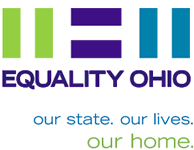Senate Education Committee Unanimously Passes
Safe Schools Bill that Includes Two Out of Three Provisions Promoted by
Equality Ohio
For immediate release
January 10, 2012
For more information contact:
Ed Mullen, Executive Director
Columbus, Ohio -- This morning, the Ohio Senate Education Committee passed HB116, also known as the “Jessica Logan Act”, unanimously. This bill includes provisions that protect Ohio students from the rising trend of cyber-bullying and require school districts to provide more comprehensive training on anti-bullying policies. The bill, however, was amended in committee this morning to exclude a provision that would prohibit bullying based on any real or perceived characteristics of the student, such as race, disability, sexual orientation and gender identity, and the bill did not include enumeration of particular characteristics.
Since the current anti-bullying law was passed in 2006, Equality Ohio has worked closely with coalition partners, including the Ohio Suicide Prevention Foundation, the Ohio Psychological Association, and the University of Toledo Law School Safe Schools Project, to pass a comprehensive bill that strengthens the law to include cyber-bullying, training, and enumeration. We are certainly pleased that the committee has passed provisions relating to cyber-bullying and training, and we look forward to these provisions becoming law in Ohio. “Protecting students against cyber-bullying and improving training on anti-bullying policies will have a positive effect on our schools and make them more safe for students,” says Ed Mullen, Executive Director of Equality Ohio.
However, Equality Ohio is very disappointed that enumeration was not included in the bill. Academic studies and empirical evidence demonstrate that enumeration is critical to a strong anti-bullying policy. Ohio Department of Education discipline data shows that bullying has risen nearly 50% in Ohio from 2005 to 2007, despite passage of generic anti-bullying legislation in 2006. In Ohio, nearly one-fifth (18%) of Ohio students at schools with generic policies felt unsafe, while only 2% of students at schools with enumerated policies did. Students who attend schools with enumerated policies are harassed far less often for reasons such as their physical appearance, their sexual orientation or their gender expression; are less likely than other students to report a serious harassment problem at their school; and are 50% more likely to feel very safe at school.
Enumeration is particularly important for already vulnerable groups of students. LGBT students in states that don’t require enumeration have the same experience of bullying as those without any anti-bullying and harassment laws at all. Enumeration provides teachers and other school officials the tools they need to implement anti-bullying and harassment policies, which makes it easier for them to prevent bullying and intervene when incidents occur.
The Ohio School Board Association opposed enumerating Ohio’s anti-bullying law because they were concerned about additional potential liability. “Ironically, the best way for schools to prevent liability is to implement and enforce strong anti-bullying policies that include enumeration. These policies will prevent bullying in many cases and enable teachers and administrators to respond effectively when necessary, reducing the risk of lawsuits. Moreover, the existence and enforcement of strong anti-bullying policies would be an effective defense to lawsuits that are filed,” says Ed Mullen.
A standalone bill that would enumerate Ohio’s anti-bullying law, HB208, is pending before the House Education Committee, and Equality Ohio will continue to work to move this bill forward.
Equality Ohio advocates and educates to achieve fair treatment and equal opportunity for all Ohioans regardless of their sexual orientation or gender identity or expression. For more information visit www.equalityohio.org or give us a call at (614) 224-0400.
# # #

No comments:
Post a Comment